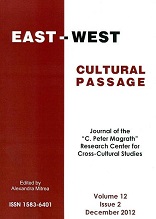Achebe’s Fiction and the Changing Generation of Nigerian Women: Towards a Paradigm Shift in Leadership
Achebe’s Fiction and the Changing Generation of Nigerian Women: Towards a Paradigm Shift in Leadership
Author(s): Uzoechi NwagbaraSubject(s): Literary Texts
Published by: Editura Universitatii LUCIAN BLAGA din Sibiu
Keywords: Achebe’s women; anagnorisis; democracy; generational change; Nigeria; paradigm shift
Summary/Abstract: The universe of Achebe’s fiction is awash with representations of women as “second class citizens,” to borrow Buchi Emecheta’s phrase or “the second sex,” to cite Beauvoir’s expression. This mode of female representation as well as womanhood’s meanings in Achebe’s world is sustained by the logic of chauvinistic modus operandi, patriarchy, that owes its existence and pathogenesis to stereotyped provenance of traditional African world-view prima facie phallocentric and hegemonic. This system has spawned a leadership pattern that relegates women to the background. However, Achebe’s novels, as this essay shall argue, calibrate the rise and fall of patriarchy – the changed colour of Achebe’s (African) women representation. Thus, Achebe’s novels mediate this shift. Beginning with Achebe’s artistic primer, Things Fall Apart (1958) to his last novel, Anthills of the Savannah (1987), an aesthetic sensibility is couched in reflecting the cartography of change, which inheres in re-shaping male-dominated leadership structure for democratic leadership. The central question in this essay is to tease out how Achebe reflects women’s leadership empowerment precipitated by self-discovery (Aristotelian anagnorisis) that resonates with a paradigm shift in leadership. Paradigm shift is a marker for canonical change in practice capable of radicalising established practices. This paradigm shift is central to re-mapping Africa’s male-female dichotomy as well as potent in changing African politics.
Journal: East-West Cultural Passage
- Issue Year: 12/2012
- Issue No: 2
- Page Range: 61-83
- Page Count: 23
- Language: English
- Content File-PDF

